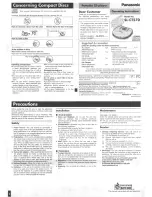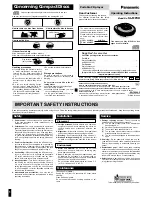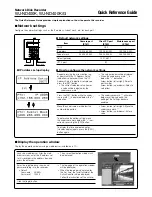
72
Glossary
DTS-HD Master Audio | Essential
DTS-HD Master Audio | Essential is a lossless audio
compression technology developed for the next
generation high definition optical disc format.
Upscaling (upconverting) refers to a function of
various players and devices that enlarge the image
size to fit the size of the screen of video equipments
such as a TV.
A disc format that contains up to eight hours of
moving pictures on a disc the same diameter as
a CD. A single-layer single sided DVD holds up to
4.7 GB; a double layer single-sided DVD, 8.5 GB; a
single layer double-sided DVD, 9.4 GB; double-layer
double-sided DVD, 17 GB. The MPEG 2 format was
adopted for efficient video data compression. It is
a variable rate technology that encodes the data to
according to the status of the video for reproducing
high-quality images. Audio information is recorded
in a multi-channel format such as Dolby Digital,
allowing for a realistic audio presence.
A DVD+/-R is a recordable, write-once DVD.
Since contents can be recorded and cannot be
overwritten, a DVD+/-R can be used to archive data
or for storing and distributing video material. The
DVD+/-R has two different formats: VR format and
Video format. DVDs created in Video format have
the same format as a DVD video, while discs created
in VR (Video Recording) format allow the contents to
be programed or edited.
DVD+/-RW (pages 9, 26)
A DVD+/-RW is a recordable and rewritable DVD.
The re-recordable feature makes editing possible.
The DVD+/-RW has two different formats: VR format
and Video format. DVDs created in Video format
have the same format as a DVD video, while discs
created in VR (Video Recording) format allow the
contents to be programed or edited.
HDMI (High-Definition Multimedia Interface) is an
interface that supports both video and audio on
a single digital connection. The HDMI connection
carries standard to high definition video signals
and multi-channel audio signals to AV components
such as HDMI equipped TVs, in digital form without
degradation.
Infrastructure mode (page 20)
Infrastructure mode is a wireless LAN
communication format. This performs wireless
communication through an access point.
Interlace format
Interlace format shows every other line of an image
as a single “field” and is the standard method for
displaying images on television. The even numbered
field shows the even numbered lines of an image,
and the odd numbered field shows the odd
numbered lines of an image.
JPEG (Joint Photographic Experts Group) is a still
image data compression format and is used in most
of digital cameras.
Linear PCM Sound
Linear PCM is a signal recording format used for
Audio CDs and on some DVD and Blu-ray discs. The
sound on Audio CDs is recorded at 44.1 kHz with
16 bits. (Sound is recorded between 48 kHz with 16
bits and 96 kHz with 24 bits on DVD video discs and
between 48 kHz with 16 bits and 192 kHz with 24
bits on BD video discs.)
MHL (Mobile High-definition Link) (page
MHL is a mobile audio and video interface standard
for transmitting digital audio and high definition (HD)
video (1080p/30fps) without any compression.
MP3 files are audio data compressed in the
MPEG1/2 Audio layer-3 file format. “MP3 files” have
“.mp3” as extensions.
MPEG-2
MPEG-2 (Moving Picture Experts Group phase 2) is
one of the video data compression schemes, which
is adopted for DVD videos and digital broadcasts
worldwide. Some Blu-ray Discs also use high bitrate
MPEG-2.
This is a feature of DVD and BD video discs. In
some discs, the same scene is shot from different
angles, and these are stored in a single disc so you
can enjoy playback from each angle. (This function
can be enjoyed if the disc is recorded with multiple
angles.)
Multi Audio
This is a feature of DVD and BD video discs. This
function makes it possible to record different audio
tracks for the same video, so you can enhance your
enjoyment by switching the audio. (You can enjoy
this function with discs recorded with multiple audio
tracks.)







































